
Just days after President Trump threatened to wage war on the city of Chicago, ICE launched what it called “Operation Midway Blitz,” and President Trump claimed the city was “about to find out why it’s called the Department of WAR” — a reference to his order to rename the Department of Defense. On Monday, the Supreme Court allowed the Trump administration to resume indiscriminate immigration raids in Los Angeles. “Donald Trump is targeting Los Angeles and California because this is a city and a state in which multiculturalism and ethnic diversity have worked,” says Viet Thanh Nguyen, Pulitzer Prize-winning author. He also discusses Trump’s use of the term “Chipocalypse Now,” a reference to the epic Vietnam War film Apocalypse Now, and discusses how his Vietnamese heritage led him to support Palestinian liberation. “I identified strongly with the plight of Palestinians, because one of the first things that one of the Israeli ministers said after October 7 was that they were fighting human animals — by which he meant Palestinians — and that idea of reducing other people to being less than human is one of the key narrative acts that justifies genocide,” he says.
Transcript
AMY GOODMAN: This is Democracy Now!, democracynow.org, The War and Peace Report. I’m Amy Goodman.
Just days after President Trump threatened to wage war on Chicago, ICE has launched a major operation to target the city’s undocumented population. ICE has dubbed the effort “Operation Midway Blitz.” Homeland Security Assistant Secretary Tricia McLaughlin said Chicago is being targeted in part because it’s a sanctuary city. Illinois Governor JB Pritzker criticized the ICE sweep, saying, quote, “Instead of taking steps to work with us on public safety, the Trump administration’s focused on scaring Illinoisans.”
On Saturday, President Trump wrote on social media, “Chicago about to find out why it’s called the Department of WAR.” That’s a reference to his order to change the name of the Department of Defense Friday. Trump accompanied the message with an AI-generated image depicting himself as Lieutenant Colonel Bill Kilgore from the epic Vietnam War film Apocalypse Now. Trump is pictured in front of the Chicago skyline with helicopters, flames and the phrase “Chipocalypse Now.” He also wrote, “I love the smell of deportations in the morning” — a reference to one of the most infamous lines in the film: “I love the smell of napalm in the morning.” After facing widespread criticism, Trump then walked back the war threat.
Meanwhile, the Supreme Court has allowed the Trump administration to resume indiscriminate immigration raids in the Los Angeles area. In her dissent, Justice Sonia Sotomayor wrote, quote, “We should not have to live in a country where the Government can seize anyone who looks Latino, speaks Spanish, and appears to work a low wage job.”
We go now to Pasadena, California, where we’re joined by Viet Thanh Nguyen, Pulitzer Prize-winning author and scholar. His most recent book, To Save and to Destroy: Writing as an Other. He’s professor at the University of Southern California, which is in Los Angeles.
We welcome you back to Democracy Now!, Viet. Let’s begin with this Supreme Court ruling that the ICE raids can continue in Los Angeles. Your response?
VIET THANH NGUYEN: Thanks for having me again, Amy.
Of course, it’s outrageous. It’s a ridiculous enactment of racial profiling, which seems enormously hypocritical in an age when the Supreme Court ruled that race cannot be considered for university admissions, but clearly here says that race and other signifiers of supposed foreignness can be considered for ICE to just pull over anyone who they consider to be Brown and potentially a foreigner.
AMY GOODMAN: And talk more about what this has meant for Los Angeles, the level of racial profiling — we heard just now what Justice Sonia Sotomayor said — the ability to stop people simply because they’re Brown, the number of people who have been detained in raids, from the Home Depot parking lots and beyond.
VIET THANH NGUYEN: Donald Trump is targeting Los Angeles and California because this is a city and a state in which multiculturalism and ethnic diversity have worked. California has the fourth-largest economy in the world. We’ve incorporated large numbers of people from all over the place, doing different kinds of jobs. And we’ve demonstrated that the American experiment in multicultural democracy and capitalism can actually function. Donald Trump doesn’t like to see this kind of thing. He wants to see a white supremacist, white nationalist version of capitalism, hence his targeting of successful, democratically led, and oftentimes Black-led, cities.
And so, the targeting is really, obviously, a terrible thing. We, you know, many of us in California, know people who are Latino, who are Brown, who are immigrants, who are documented, who are undocumented, and so on. They are productive, helpful members of our society. And by terrorizing them, Donald Trump seeks not only to cow them and to drive them out of this country, but he also seeks to terrorize and to cow those who are friends and allies of these people, as well.
AMY GOODMAN: We’re talking to Viet Thanh Nguyen, Pulitzer Prize-winning author of several books, including, most recently, To Save and to Destroy: Writing as an Other, professor of English at the University of Southern California. I wanted to talk to you about the social media post of President Trump. We just talked about it, where he wrote, “Chicago about to find out why it’s called the Department of WAR” — of course, referencing his order to change the name of the Department of Defense last Friday. Trump accompanied the message with this AI-generated image depicting himself as Lieutenant Colonel Bill Kilgore from the epic Vietnam War film Apocalypse Now, Trump pictured in front of a Chicago-style — a Chicago skyline with helicopters, flames and the phrase “Chipocalypse Now,” also writing, “I love the smell of deportations in the morning,” a reference to this, one of the most famous lines in the film.
LT. COL. BILL KILGORE: [played by Robert Duvall] I love the smell of napalm in the morning.
AMY GOODMAN: “I love the smell of napalm in the morning.” Viet Thanh Nguyen, when we saw this this weekend, we thought, “Who best could talk about the significance of this film?” Especially, I mean, you’re a college professor. You know many young people have never even heard about it, a film from the 1970s. But this is a film you’ve often written about and spoken about, that defined you as a child of Vietnam. Can you talk about the significance of this post, every dimension of it?
VIET THANH NGUYEN: This is such — this is such an absurd post, but it’s also an incredible post, because it compacts so much of American history into a couple of lines. And so, what’s basically happening here is that Donald Trump is referring to an entire history that extends to the very origins of American society, origins that are rooted in policies of ethnic cleansing and genocide. We’re seeing that continuation of ethnic cleansing, of course, here in Los Angeles and elsewhere in the United States, but we’ve had a long history of deportations and ethnic cleansings that have been directed at Indigenous peoples, at Mexicans, at Brown people and so on.
And the connection with the Vietnam War is that by the time the United States got to fighting the war in Vietnam, it had this entire history of genocide built into its consciousness, its culture, its politics, its military, so that when American soldiers went into Vietnam, the mythologies that they brought with them were basically the mythologies of the Western and of Indian wars and so on, which is why American soldiers referred to the land in Vietnam as “Indian Country.” So, in that moment when Colonel Kilgore is saying he loves the smell of napalm in the morning, it’s obviously directed at Viet Cong guerrillas, but the smell of burning bodies is evoking the entire history of American troops going into Native villages, burning them down and massacring people, cleansing the land in order for American conquest.
This is the kind of history that Donald Trump wants to evoke, wants to celebrate, by using rhetoric like, “I love” — excuse me, “I love deportations,” but also turning the Department of Defense into the Department of War — one of the more honest things that he’s done. And so, by evoking Apocalypse Now, he is evoking a long string of ideology, but also of pop cultural references that he thinks celebrates American masculinity and macho militarism.
The irony, of course, is that this is a war, the Vietnam War, that the United States lost, in fact. But I think Donald Trump can get away with it, because he understands something very basic about the development of American military power over the last few decades, which is the United States doesn’t really have to win wars. We just go in and kill a lot of people. And even if we lose that war officially, we still maintain American dominance and hegemony. And I think that’s what he’s trying to do right now.
AMY GOODMAN: I want to go to another clip from the film Apocalypse Now, where you have — you hear Marlon Brando’s voice. He’s playing Colonel Kurtz.
COL. WALTER KURTZ: [played by Marlon Brando] We train young men to drop fire on people, but their commanders won’t allow them to write [bleep] on their airplanes because it’s obscene.
AMY GOODMAN: What he’s saying, “We train young men to drop fire on people, but their commanders won’t allow them to write [the F-word] on their airplanes because it’s obscene.” For those who don’t know this story, if you can talk about the significance of this? And then it’s a bigger point that you make as a Vietnamese American, is who is centered and who isn’t, even though this is considered a great antiwar film by Francis Ford Coppola. As a Vietnamese refugee, you talk about what’s missing, as well.
VIET THANH NGUYEN: I mean, the movie is a satire of American militarism. It’s definitely a critique of American war power and so on. And it’s a very powerful movie in that regard. That satire completely is missed by Donald Trump in embracing the figure of Kilgore, who is meant to be a satirized figure.
But one of the things that happens in Apocalypse Now is that Francis Ford Coppola is drawing from this history of colonial genocide. Apocalypse Now is based on Heart of Darkness by Joseph Conrad, which is a devastating condemnation of what the Belgians did in the Congo in the late 19th and early 20th century, killing millions of Black Congolese in their efforts to extract resources from that country. However, in both Conrad’s novel and in Apocalypse Now, the drama is centered on white men. And what gets erased in the case of the Heart of Darkness is the subjectivity of the Congolese people. And what happens in Apocalypse Now is that Vietnamese people are erased and silenced, as well.
So, on the one hand, in these narratives of liberalism in Joseph Conrad and Francis Ford Coppola, we see a condemnation of racism and war, but also something that’s carried out at the expense of the so-called Natives and savages themselves. And so, that part of liberal narratives of antiracism which silences people of color and people from different countries is something that Donald Trump has intuitively grasped. So that’s one of the reasons why I think he’s able to use Apocalypse Now to stage a narrative about deportation, because in Apocalypse Now, you know, the Vietnamese people have basically been deported from their own narrative.
AMY GOODMAN: I wanted to go to the trip you’re about to embark on, Viet. You’re coming to Boston, then you’re coming here to New York on September 21st. You will be at New York’s Town Hall along with another Pulitzer Prize winner, the Palestinian writer Mosab Abu Toha, and others. It’s an event called “Voices for Gaza.” And so, if you can put together all of this — what’s happening in Los Angeles, President Trump declaring war on Chicago, these historic, I mean, the largest raids on immigrants this country has ever seen — and how you relate that to what’s happening right now in Gaza?
VIET THANH NGUYEN: My understanding of American history is that it has been a narrative of white nationalism and white supremacy, which has been dependent upon creating and dehumanizing and demonizing various others throughout American history. That power of othering is still with us today. I’ve certainly experienced it as a Vietnamese refugee who experienced the full brunt of American military power and who came to the United States and saw some of the racism that’s been directed at Asians, Latinos, Black Americans, Indigenous peoples and more.
And so, when October 7th happened, what I saw was not simply the tragedy that took place on that day, but an entire history of genocidal warfare and colonization that Israel had already been engaged in in Palestine. And I identified strongly with the plight of Palestinians, because one of the first things that one of the Israeli ministers said after October 7th was that they were fighting human animals — by which he meant Palestinians — and that idea of reducing other people to being less than human is one of the key narrative acts that justifies genocide.
So, I stood up as strongly as I possibly could and spoke out in support of Palestinians and warned as strongly as I could that this war that Israel would embark in would be a war of genocide. So, it’s been my honor and my privilege to try to lend my full support to Palestinians, especially to Palestinian writers, like Mosab Abu Toha. And so, on September 21st, that will be an event devoted primarily to Palestinian voices and writers, but with a few of us who have been allies to the Palestinian cause, as well. We’ll be there at Town Hall in New York City, and all ticket sales will go to help Palestinian children and orphans in Gaza.
AMY GOODMAN: Viet Thanh Nguyen, I remember interviewing you right after the 92nd Street Y. You were invited, and then it was canceled. Explain more about that.
VIET THANH NGUYEN: Well, that happened in late October of 2023. And as I said, when October 7th happened, I reacted very viscerally to those events. And I signed a letter soon after October 7th, along with 750 other writers and artists from around the world, warning about the possibilities of genocide taking place, and calling for a ceasefire. That letter was actually very controversial, and I probably made it more controversial by posting about it on Instagram and bringing up this issue of human animals, and also affirming my support for Boycott, Divestment, Sanctions. I think it was that constellation of things that got me disinvited from the 92nd Street Y, which is a self-proclaimed Jewish cultural institution.
Now, nearly two years later, I think that we, the signers of that letter, have been validated. It has, in fact, been a war of genocide. It’s been impossible now, two years later, with so many experts weighing in, to deny that a genocide is actually taking place. And so, the calls for ceasefire, it’s still important, and so is this demand of recognition of genocide, as well. And so, again, two years later, you know, we should listen to Palestinians, we should listen to writers, we should listen to artists, we should listen to scholars, who have been dealing with these issues of othering and colonialism and genocide, when they tell us what is actually taking place.
AMY GOODMAN: The comparison you see between, well, going back to Vietnam and, as we speak now, Israel dropping pamphlets and bombs on the largest city in Gaza, on Gaza City?
VIET THANH NGUYEN: The parallels are very striking. The United States, when it went into Vietnam, on the one hand, it was fighting to support an ally, but it was also fighting an enemy at the same time. And basically, what the United States did, as the journalist Nick Turse documented, was to kill everything that moves. Every dead Vietnamese was counted as a Viet Cong. And that is a genocidal policy that was certainly carried out throughout American history in fighting the Indian wars.
And it’s the same policy that Israel is carrying out in Gaza, as well: indiscriminate killing of Palestinians. Any dead Palestinian is considered to be a potential enemy. This kind of mindset, where there is no distinction between enemy and civilian, is genocidal. It’s certainly a policy of ethnic cleansing. It’s hard to deny that what Israel is doing is very deliberately policy at this moment of trying to get rid of the Palestinians in Gaza.
And so, I see a distinct structural parallel and similarity between what Israel is doing in Gaza City at the moment and with Trump’s rhetoric of deportation. If Trump had his way, he would literally try to deport every nonwhite person that he can. And he’s getting off to a pretty strong start at this moment.
AMY GOODMAN: We have to leave it there, Viet Thanh Nguyen, Pulitzer Prize-winning author and scholar. We will see you in New York at Voices of Gaza. That does it for our show. I’m Amy Goodman.

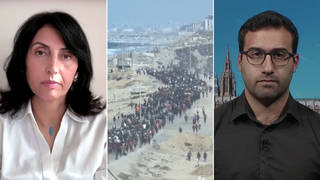
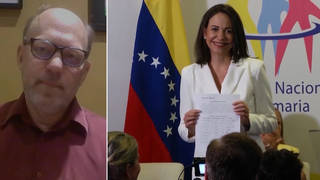
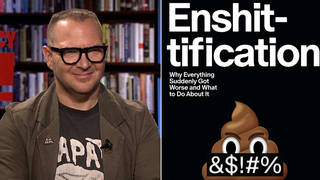





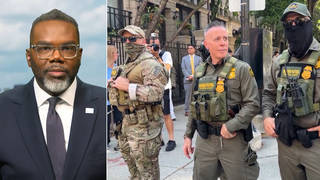
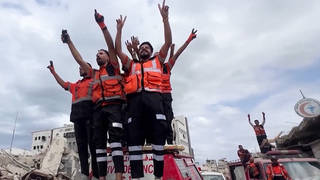
Media Options